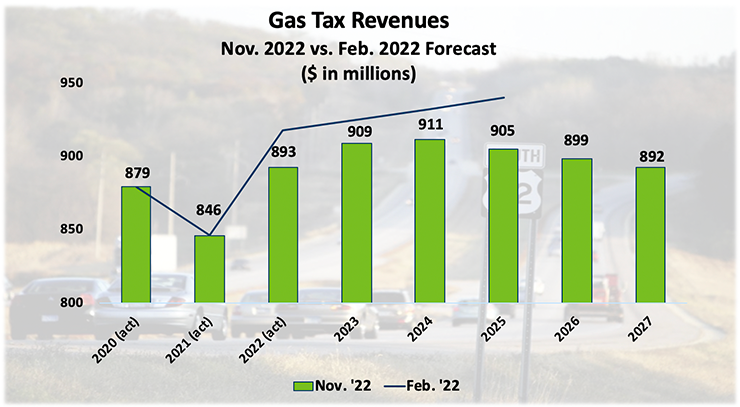Budget picture not so rosy for Minnesota transportation
News | Published on January 30, 2023 at 2:02pm CST

With gas taxes, motor vehicle excise taxes and tab fees are all coming in lower than was projected a year ago, are tax hikes coming?
By Peter Callaghan
Minnpost.com
The primary mood among Minnesota state lawmakers this session is giddy, that lighthearted feeling that comes from the spending and tax cut potential of a $17.6 billion surplus.
That mood stops at the doors of the two transportation committees. While general state income and sales taxes continue to exceed even optimistic projections, the taxes that provide for road construction and maintenance and transit systems are going in the other direction.
Gas taxes, motor vehicle excise taxes and tab fees are all coming in lower than was projected a year ago, leaving holes in the funding streams for highways and transit. While other committee chairs are talking about spending increases and tax cuts, the transportation committee chairs are looking at cuts and proposing tax increases.
“In the specific transportation funds … those are lagging behind,” said House Transportation Committee Chair Frank Hornstein, DFL-Minneapolis. “So while the rest of the state budget has a surplus, we have a deficit in transportation.”
Why the difference? The pandemic did more damage to the transportation tax sources than to general fund tax sources. Blame lower car sales during the recession and then lower sales when chip shortages reduced supply. Blame less taxable gas purchases on factors like more efficient vehicles and a spike in gas prices that doesn’t benefit the state’s per-gallon tax.
To be clear, budget analysts say, revenue from these taxes is growing — just not like other state taxes and not enough to keep up with transportation expenses. And those general taxes are outperforming the projections of economists, while transportation taxes are underperforming.
Paul Brown, the budget director for the Minnesota Department of Transportation, told the House Transportation Committee this week that the flow of money won’t meet the projected costs of the state’s highway and bridge construction schedule. In the current two-year budget period, transportation tax collections are down 3.5% compared to what was projected — equal to $184 million. And those collections are due to be below projections in the next two-year budget by 3.8% or $210 million.
Transportation taxes raise around $5 billion every two years.
“Revenues continue to grow year over year,” Brown said. “However, the growth rates are less than what we had assumed last February. The reality is, revenue is not keeping up with inflation.”
Then there’s the Met Council, the primary provider of bus service in the Metro area of Minneapolis and St. Paul. It relies on the motor vehicle sales tax — 40% of which goes to transit with Metro Transit getting 36 percent. But those collections have suffered as well. Mary Bogie, the regional administrator for the Met Council, told the committee that it, too, is growing year over year but is below what was forecast.
The money funds buses, not the light rail system, which has its own money troubles. And the current shortfall — $37.5 million this budget period on a base of about $740 million — isn’t necessarily new or short lived. The council staff estimates that the motor vehicle sales tax dedicated to buses will produce $121.4 million less over the next four years than had been estimated by forecasters.
Motor vehicle sales
tax revenues
Two factors have pushed off a budget deficit — what the council calls a fiscal cliff: One is an infusion of cash by lawmakers in 2019, and the other is the series of allocations from congressional pandemic relief packages. Between the CARES Act, the Coronavirus Response and Relief Supplemental Appropriations Act and the American Rescue Plan, Metro Transit received $626 million for operating costs and another $100 million for capital costs such as bus purchases.
“We have long been struggling with revenue that doesn’t support the needs of the system,” Bogie said.
Hornstein sponsored a package of transportation tax hikes in the past, including in 2021. Those increases didn’t get through the GOP-controlled Senate, though the Senate did agree to additional funding to expand the regional bus rapid transit network. In the recent past, GOP lawmakers have moved to devote state sales taxes collected on car parts to roads and bridges. That raised nearly $200 million in 2022.
This session, Hornstein has a DFL majority in the Senate that could produce a different result. It included a 5-cent-per-gallon increase in the 28.5-cent state gas tax, an increase in the motor vehicle sales tax, a surcharge on more expensive vehicles and a provision to let the Met Council collect a transit sales tax in its seven-county service area.
“We’ll bring those back and then some,” Hornstein said. One idea used in Colorado is to assess a fee on deliveries such as those made by Amazon vans. He is also looking at ride sharing services, something the non-driving transportation chair uses when his normal bus commute is disrupted.
“We’re going to be creative, we’re going to be innovative, and we’re going to address the gap,” he said. While the pandemic contributed to revenue declines — and also led to some federal emergency cash help — the trend remains down.
“The long-term prognosis is still problematic,” he said.
Transportation Commissioner Nancy Daubenberger told the House committee that Gov. Tim Walz will present his budget plan next week that would include transportation funding.
“The department is very interested in working with the Legislature on additional revenue,” she said.
Peter Callaghan covers state government for MinnPost. Follow him on Twitter or email him at pcallaghan@minnpost.com.




